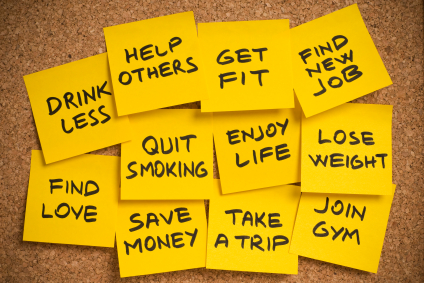 Do any of these sound familiar?
Do any of these sound familiar?
I will quit smoking. I will drink less. I will lose twenty pounds. I will spend more time with my kids. I will get out of debt. I will get organized. I will keep my resolutions this time. I will . . ., I will . . ., I will . . .!
At one time or another, we have all used the beginning of a new year as a springboard for goals we have put off. There is something about a new calendar year that feels so fresh and full of promise. And yet, within six months, most people fail to meet their New Year’s.* So why do so many people who start off so well-intentioned, get off track and fail to meet their commitments to themselves and how do we make our New Year's resolutions stick?
1. Unclear Goals or Unrealistic Goals
How will you quit smoking? How will you lose twenty pounds? How will you get out of debt. Without a clear plan, it’s not really a goal, it’s a wish. Think in terms of solid, realistic changes that you can start right now. Take for example, if you want to lose twenty pounds. You need to figure out how you can do that and what is reasonable in terms of timing. It didn’t take a month to put the weight on, it’s going to take some time to take it off. Perhaps you can quantify it something like this:
- I will add 60 minutes of physical activity each week.
- I will pack a healthy lunch each day and forgo lunch out.
- If I go out for dinner I will wrap up half my meal for another day.
- I will limit myself to 1 drink per week to cut calories.
- I will stop eating after 8pm.
- I will prep veggies and healthy snacks on Sunday when I go shopping so that I have easy healthy alternatives to the vending machine.
If you break down your goal into smaller, doable chunks, you are much more likely to stick with it.
2. No Accountability
There is a reason so many people use group settings or friends for goals revolving around things like smoking or overeating. Having a buddy can lend support and accountability that can be critical for success. If it's not for you, then consider a personal contract with yourself. You might be amazed at how powerful a tool it can be to commit to your health and well-being on paper. You can pull it out on bad days to remind yourself, “I made this commitment to myself and I’m worth it.”
3. No Rewards or Incentives / No Way to Gauge Progress
Goals are not one size fits all or one size fits forever. Too many goal setters focus only on the end result and not the small victories that add up to a big win. Changing habits is very hard and requires a way to gauge progress to stay motivated for the long haul. So break your big goals into bite size chunks and focus on the behaviors that get you to the goal. When you hit a benchmark, reward yourself for your effort with something that reinforces your progress.
5. Not Preparing For Challenges
Don’t wait until you face a challenging situation to act, plan for it. If you know a party could lead to a diet downfall, eat sensibly ahead and decide in advance what is reasonable for the occasion.
6. Demotivated By Obstacles
We are human and likely to face set backs. So you had a cigarette, ate a whole cheesecake, spent money you didn’t have. A mistake doesn’t zero out any progress you have made. Don’t immediately slide back into bad habits with abandon. Take a breath, figure out what happened to trigger you and make a plan for next time you face a difficult situation.
*Source:Norcross & Vangarelli


